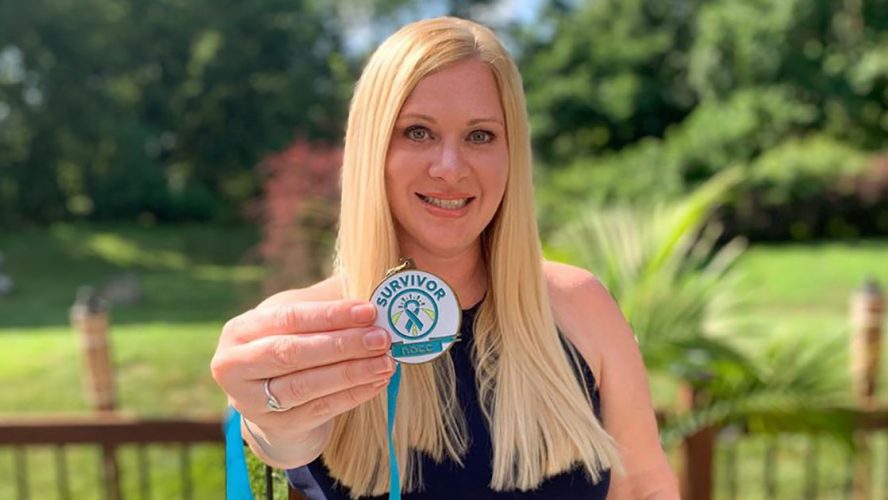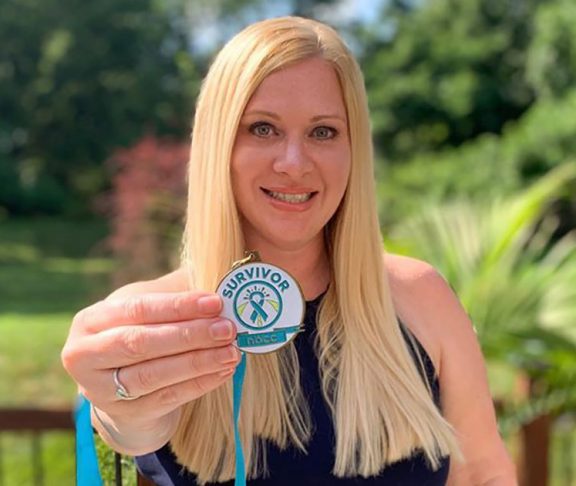In the summer 2019, now-40-year-old Christa Suchak celebrated a milestone. But the momentous occasion wasn’t the marking of a decade of marriage or a new job. Instead, she rang in her 40s as a woman with a life full of opportunity ahead of her because 10 years ago, she began fighting for her life after receiving a diagnosis of endometrial cancer.
And she won.
“The path that I dreamed of when I was a young college student did not turn out exactly as I had planned,” Suchak said. “I probably seem normal to strangers walking down the street, but my journey has been anything but typical for a young woman.”
A difficult decision
Suchak’s early symptoms were long and heavy periods that, before her diagnosis, doctors had pegged to hormonal changes and generic birth control. But eventually they discovered a polyp in her uterus that progressed quickly in a matter of months and led to painful, three-week-long bleeding. Her doctor diagnosed her with stage 1 endometrial cancer and recommended surgery, which was scheduled for a few months later.
Suchak’s mother had endometrial cancer, too, so she didn’t waste any time educating herself and preparing for treatment. “Despite my shock and fear, I immediately sprang into action and became my own best advocate,” she explained. “I created a binder, did research, and tried to understand how this could be happening to a 29-year-old.”
She underwent genetic testing, got a second opinion on her diagnosis, and made the difficult choice to forgo egg preservation, opting for immediate surgery instead, for the best prognosis possible.
“I was devastated by the harsh reality that I would not be able to have children. For many years watching commercials with babies had me leaving the room since it was emotionally hard,” Suchak said.
A shocking realization
On top of surgery for endometrial cancer, Suchak’s mom discovered she had a rare genetic disease called Muir-Torre syndrome, which is a type of Lynch syndrome. According to the Centers for Disease Control and Prevention (CDC), Lynch syndrome is the most common cause of hereditary colorectal cancer and can leave an individual more prone to colorectal and other types of cancer, especially prior to age 50. The syndrome is responsible for an estimated 1,800 endometrial cancers annually.
There’s a 50 percent chance of passing along the genetic mutation linked with Lynch syndrome to a child, and a genetic test revealed that Suchak had the variant, as well. “My genetic mutation was explained as hiccups or misspelled words in my genetic repair cells creating a high risk of many cancers,” she said.
However, yet again, Suchak decided to take her health into her own hands and begin a preventative regimen. Two weeks before her 30th birthday, she underwent a full hysterectomy, and then doctors discovered she also had ovarian cancer in her left ovary. In what Suchak described as “lucky in an unlucky situation,” she did not have to undergo radiation or chemotherapy to treat it.
A new lease on life
Today, Suchak lives with the painful reality that she will not be able to have children. She also battles side effects, such as early menopause, and undergoes annual tests and checkups to ensure she stays cancer free. But she takes pride in raising awareness of Lynch syndrome and endometrial cancer, as well as all cancers, by using her story to inform and inspire.
“Who knew how much a pair of genes would change my life,” she said. “The best advice I could offer someone facing illness is to stay positive no matter how much it tears you down, fight for the life you deserve, and please be proactive because no one at any age, class, or race is invincible to cancer, disease, and illness. Each day and year is a gift — what a year of milestones.”

